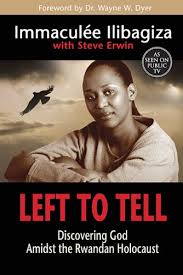Left to Tell--Questions to Consider

- Early in chapter one Immaculee writes “while my parents were ardent Catholics, they were Christians in the broadest sense of the word” what does she mean by this? Cite examples of the ways her parents lived a Christian lifestyle? What cues could we take from her parents about what a Christian lifestyle looks like?
- Throughout the book Immaculee was surprised at how ordinary people could hold such hatred and be swayed from friend to foe. Discuss this transition and site examples. Why do you think this happens over and over again in our world’s history?
- How does this book instruct us on what it means to have faith?
- What role do her beliefs play in Immaculee’s life as a child, adolescent and young adult and how does that influence her attitude toward other people? (p. 6 –child; p. 22-in high school; p. 32 –at university; p. 34-36 -encounter with mob)
- How does Immaculee feel when childhood friends turn against her, and how does she deal with her feelings about them? (p. 58 & 59)
- What resource does Immaculee call upon to help her deal with the horror of the war? (p. 80)
- Immaculee’s greatest struggle while in hiding comes with her feeling that God wants her to forgive the murderers. (94) Describe how Immaculee acts, feels and makes decisions during this tense and dangerous period.(p. 91-94)
- How does Immaculee’s faith guide her decision-making following her release? (p.107; 184-185; 207-208)
- In what ways is the Rwandan Genocide an example of social sin?
- What do Imaculee’s actions and words teach us about the concept of solidarity?
- “There is more grace in our world than sin and that hope is essential in facing all challenges” – discuss this statement in light of Imaculee’s book. Where do you see flashes of God’s grace in her story? How does hope get her through the genocide?

No comments:
Post a Comment